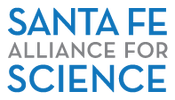|
Science Fair History Overview of the Science Fair Program Since 2007, SFAFS volunteers participated heavily in the preparation and judging of local (mostly) elementary school science fairs in the Santa Fe Public School District (SFPS). We judged both at the individual school fairs and also at the Science Expo, an event in which the best projects from the individual schools were judged again. Expo winners representing each of the grade level groupings were selected. Our work also included varying amounts of pre-fair consultation with students, helping them pick doable, inexpensive, safe science projects. The principal criteria for a student science project are that it ask a question that can be answered using the scientific method and that experimental data be collected and interpreted in the process. Such projects are said to be "inquiry-based." Others, such as models of the solar system, or mock papier-maché volcanoes, are referred to as "demonstrations." Since a major goal is to teach the value of inquiry-based learning, there is a strong emphasis on guiding students and teachers toward producing inquiry-based projects. In 2011-12, SFPS began a "triage" process whereby only inquiry-based projects were selected for outside (SFAFS) judging. The others were judged by in-school and administration personnel. This process was continued in 2012-13, but then in 2013-14 we reverted to a process in which all projects were judged on an equal basis. For SFPS, the take-home message is this: from modest beginnings seven years ago (8 participating schools and ~614 student projects (not including the appearance of 82 of them again at the Expo), the SFPS science fair program has grown to as many as 19 (out of 23 total) schools and as many as 3000 student projects (not including the Expo). Thus the program is now a mainstay of science education for SFPS elementary and middle schools – students and teachers alike are learning the processes of inquiry-based scientific discovery. We are seeing true excitement on the faces of many students, and some first-class work in addition. We also think that a well–executed inquiry–based science fair project is a superb way to advance the goal of inquiry–based learning generally. The great thing about work like this is that the student is responsible for all aspects of it, from start to finish, including generating the idea in the first place. Most other inquiry–based school activities are not nearly so thorough.
|
Proudly powered by Weebly
